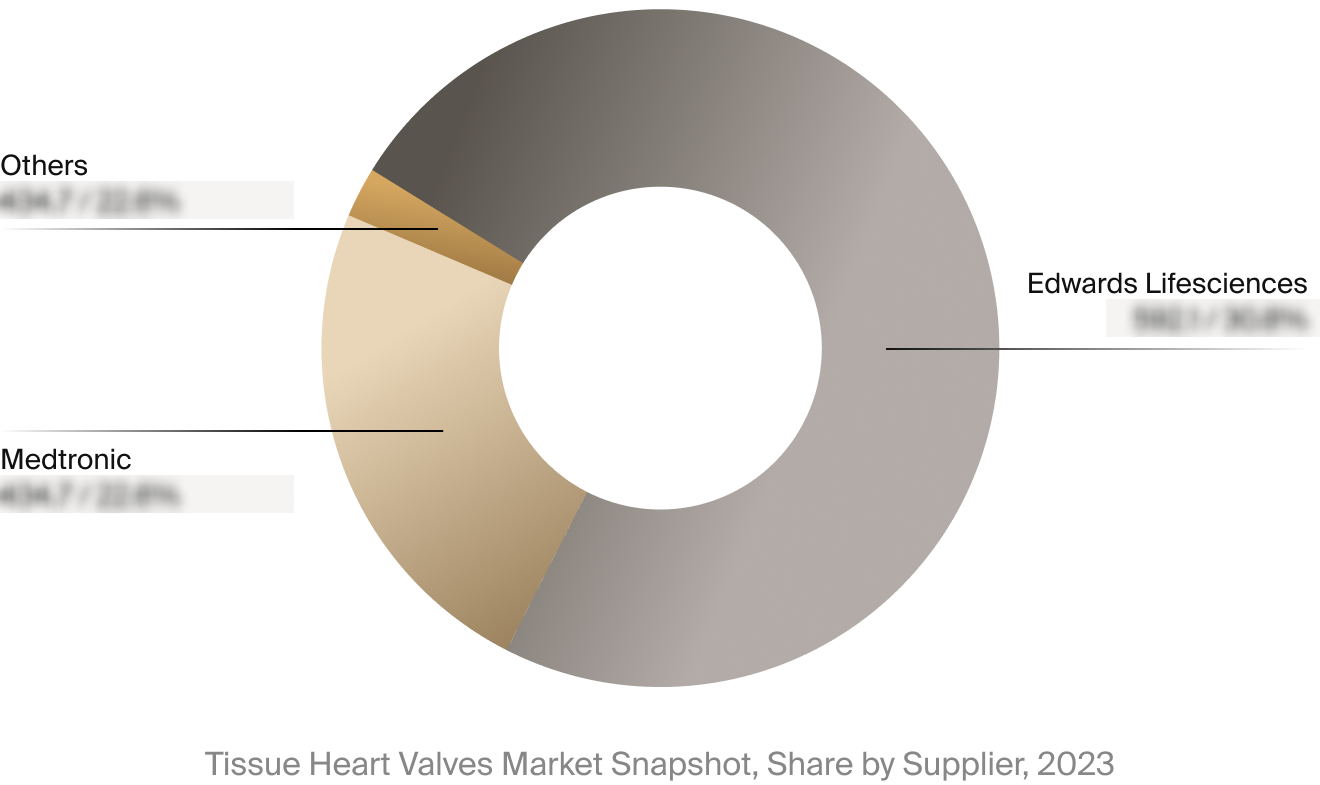Overview
Valued at ~$1.22 billion in 2023, the tissue heart valves market is projected to fall to
~$1.19 billion by 2028, decreasing at a CAGR of -0.4% over the 2023-2028
forecast period. This Market Snapshot is part of LSI’s Market Intelligence platform, your
one-stop-shop for global medtech market sizing and analysis, procedure volume data, startup company- and
deal-tracking, curated insights, and more.
Tissue heart valves are used to replace or repair damaged natural heart valves, often due to disease or aging.
These artificial valves typically contain animal tissue, which is treated to prevent immune system rejection and
preserve structural integrity. The bioprosthetic heart valve also includes a support structure and a sewing ring
for secure attachment during an open-heart procedure.
While tissue heart valves are less durable than mechanical valves, they offer the significant advantage of not
requiring long-term anticoagulation therapy once implanted. This makes them an ideal option for patients who
cannot tolerate anticoagulation therapy, providing a viable solution for those needing valve replacement without
the complications associated with prolonged blood thinners.
Tissue heart valves are part of the larger heart valve repair and replacement devices market, which also
contains mechanical
and transcatheter aortic,
mitral,
tricuspid,
and pulmonary
valves.
Products included within the scope of this analysis include:
Tissue heart valves used in open surgery
This Market Snapshot is intended to provide a high-level overview of the global market for tissue heart valves,
with key insights into:
Unit volumes from 2023 to 2028
Market forecasts from 2023 to 2028
Market insights
Competitive landscape analysis of major competitors
Insights into key market events for strategic and startups
Tissue Heart Valves Market Snapshot Summary
| Snapshot Aspect | Data and Details |
| Base Year for Estimate | 2023 |
| Forecast Period | 2023 - 2028 |
| Market Size in 2023 | $1.22 billion |
| CAGR | -0.4% |
| Projected Market Size in 2028 | $1.19 billion |
Tissue Heart Valves Market Insights
Total heart valve repair and replacement procedures are projected to grow at a CAGR of 5.5% from 2023 to 2028.
This growth reflects the projected rate of increase in hospital admissions for heart valve disease worldwide and
the positive impact of less invasive transcatheter valve replacement and repair technologies.
The heart valve repair and replacement market continues to transition to less invasive solutions. Accordingly,
the demand for tissue and mechanical heart valves is gradually declining. This decline is expected to continue
as transcatheter technologies are now the dominant approach for treating valvular diseases.
However, despite the projected decline in demand for surgical valves, companies such as Medtronic, Artivion, and
Edwards have recently reported a temporary uptick in demand. Clinical data further underscores the ongoing
importance of surgical valve replacements for patients requiring long-term durability and survival benefits,
where the device’s longevity can make surgery the preferred option.
Competitive Landscape
The full Market Snapshot includes a robust analysis of the competitive landscape for the tissue heart valves
market. This includes estimated market revenue and market share for key players, such as Edwards Lifesciences
and Medtronic.

Select Market Events
| Company | Date | Event Type | Event |
|
Edwards Lifesciences
|
7/2023 | Clinical Milestone | Edwards presented new seven-year data from the COMMENCE aortic trial evaluating the safety and durability of the company’s surgical valves made with its RESILIA tissue. |
Key Companies Covered
Abbott
Artivion
Edwards Lifesciences
Labcor
Medtronic





































































